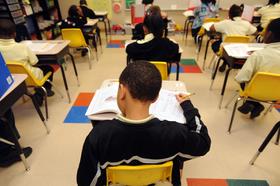For the 2025 school year, there are 3 public schools serving 760 students in West Fork Comm School District. This district's average testing ranking is 3/10, which is in the bottom 50% of public schools in Iowa.
Public Schools in West Fork Comm School District have an average math proficiency score of 64% (versus the Iowa public school average of 68%), and reading proficiency score of 70% (versus the 70% statewide average).
Minority enrollment is 8% of the student body (majority Hispanic), which is less than the Iowa public school average of 29% (majority Hispanic).
Overview
This School District
This State (IA)
# Schools
3 Schools
1,320 Schools
# Students
760 Students
501,674 Students
# Teachers
55 Teachers
34,800 Teachers
Student-Teacher Ratio
14:1
14:1
Student By Grade
District Rank
West Fork Comm School District, which is ranked within the bottom 50% of all 325 school districts in Iowa (based off of combined math and reading proficiency testing data) for the 2022-2023 school year.
The school district's graduation rate of 85% has decreased from 90% over five school years.
Overall District Rank
#242 out of 327 school districts
(Bottom 50%)
(Bottom 50%)
Math Test Scores (% Proficient)
64%
68%
Reading/Language Arts Test Scores (% Proficient)
69%
70%
Science Test Scores (% Proficient)
60-64%
63%
Graduation Rate
85%
90%
Students by Ethnicity:
Diversity Score
0.14
0.47
% American Indian
1%
n/a
% Asian
n/a
3%
% Hispanic
3%
13%
% Black
1%
7%
% White
93%
71%
% Hawaiian
n/a
1%
% Two or more races
2%
5%
All Ethnic Groups
District Revenue and Spending
The revenue/student of $15,358 in this school district is less than the state median of $16,468. The school district revenue/student has stayed relatively flat over four school years.
The school district's spending/student of $13,445 is less than the state median of $16,042. The school district spending/student has stayed relatively flat over four school years.
Total Revenue
$12 MM
$8,262 MM
Spending
$10 MM
$8,048 MM
Revenue / Student
$15,358
$16,468
Spending / Student
$13,445
$16,042
Best West Fork Comm School District Public Schools (2025)
School
(Math and Reading Proficiency)
(Math and Reading Proficiency)
Location
Quick Facts
Rank: #11.
West Fork Elementary At Rockwell
(Math: 70-74% | Reading: 70-74%)
Rank:
Rank:
6/
Top 50%10
210 S 2nd St
Rockwell, IA 50469
(641) 822-3234
Rockwell, IA 50469
(641) 822-3234
Gr: PK-5 | 389 students Student-teacher ratio: 16:1 Minority enrollment: 6%
Rank: #22.
West Fork High School
(Math: 55-59% | Reading: 70-74%)
Rank:
Rank:
4/
Bottom 50%10
453 N. 5th St.
Sheffield, IA 50475
(641) 892-4461
Sheffield, IA 50475
(641) 892-4461
Gr: 9-12 | 196 students Student-teacher ratio: 12:1 Minority enrollment: 10%
Rank: #33.
West Fork Middle School
(Math: 60-64% | Reading: 65-69%)
Rank:
Rank:
3/
Bottom 50%10
504 Park Street
Sheffield, IA 50475
(641) 892-4159
Sheffield, IA 50475
(641) 892-4159
Gr: 6-8 | 175 students Student-teacher ratio: 13:1 Minority enrollment: 9%
Frequently Asked Questions
How many schools belong to West Fork Comm School District?
West Fork Comm School District manages 3 public schools serving 760 students.
What is the rank of West Fork Comm School District?
West Fork Comm School District is ranked #238 out of 325 school districts in Iowa (bottom 50%) based off of combined math and reading proficiency testing data for the 2022-2023 school year.
What is the racial composition of students in West Fork Comm School District?
93% of West Fork Comm School District students are White, 3% of students are Hispanic, 2% of students are Two or more races, 1% of students are American Indian, and 1% of students are Black.
What is the student/teacher ratio of West Fork Comm School District?
West Fork Comm School District has a student/teacher ratio of 14:1, which is equal to the Iowa state average of 14:1.
What is West Fork Comm School District's spending/student ratio?
The school district's spending/student of $13,445 is less than the state median of $16,042. The school district spending/student has stayed relatively flat over four school years.
Recent Articles

Why Single-Sex Public Schools are Growing in Popularity
This article examines the growing trend of single-sex public schools in the United States. It explores the potential benefits, research findings, and controversies surrounding gender-specific education, as well as the factors driving its increasing popularity among parents and educators.

When Teachers Cheat: The Standardized Test Controversies
Teachers across the country are being accused of cheating on standardized tests, using erasers to conveniently change their students’ answers. However, are these teachers driven to cheat because the funding system is flawed?

When Field Trips Turn Deadly: Who is Responsible?
Recent deaths during field trips have parents and school officials questioning the safety of these excursions. Learn about these tragedies and what parameters should be in place to ensure a safe field trip.





